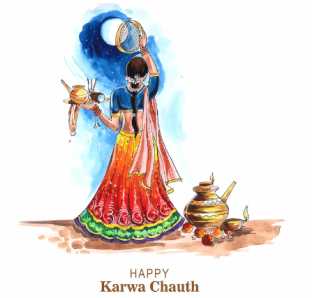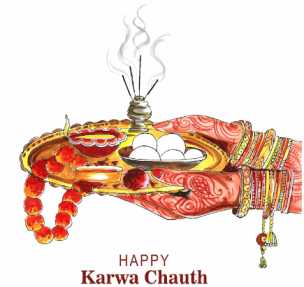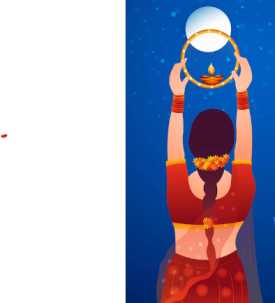Karwa Chauth 2024: Significance, Rituals, Fasting Guide, and Stories Behind the Festival
Karwa Chauth 2024: A Festival of Devotion and Longevity for Married Women
Karwa Chauth: A Festival Observed for Husbands’ Longevity

India is a country steeped in rich culture and traditions. Festivals play a significant role in Indian Hindu culture, each with its own unique story and relevance. Karwa Chauth is a special occasion celebrated by married women who fast from sunrise to moonrise, praying for the long life and well-being of their husbands. The festival is a symbol of the respect and love Indian women have for their spouses.
When is Karwa Chauth Celebrated?
The name Karwa Chauth derives from the word “Karwa,” meaning earthen pot, and “Chauth,” meaning the fourth day of the dark fortnight in the month of Kartika. On this day, women offer Argya to the moon using a Karwa. In 2024, Karwa Chauth will be observed on Sunday, October 20, 2024.
Date of Karwa Chauth 2024 and Puja Mahurat
This year, Karwa Chauth will be celebrated on Sunday, October 20, 2024. The Puja Mahurat and moonrise timings will be essential for performing the rituals and breaking the fast.
How Karwa Chauth is Celebrated
Karwa Chauth is all about Indian married women praying for their husband’s longevity. Women gather to perform rituals, offer Argya to the moon, and exchange Karwas with one another. The Karwas are filled with grains and decorated before the pooja. Married women apply mehndi, wear traditional attire, and offer prayers to Chauth Mata.
The fast begins with eating Sargi, a pre-dawn meal prepared by the mother-in-law, consisting of sweets, fruits, dry fruits, and halwa. Sargi provides the necessary energy for the day-long fast, which ends after the moonrise when women offer Argya and look at their husbands through a sieve before breaking the fast.
Why Do We Celebrate Karwa Chauth?

Karwa Chauth has a deep-rooted cultural significance in India. Historically, it was observed in regions where men were part of military forces, and their wives fasted for their husbands’ safety. The festival also coincides with the Rabi cropping season, where women would offer earthen pots filled with wheat grains as part of the rituals.
Another belief suggests that girls were often married young and found Karwa Chauth to be an opportunity to gather with other women, exchanging gifts and celebrating friendships. In recent times, some husbands also fast alongside their wives as a gesture of love and solidarity.
Stories Behind Karwa Chauth
Several legends are associated with the celebration of Karwa Chauth, two of the most popular being:
- Queen Veervati’s Story: Queen Veervati, the only sister of seven brothers, fasted for her husband’s life. Her brothers tricked her into breaking her fast early, which led to her husband’s death. Through her devotion and prayers, she brought him back to life with the help of Goddess Parvati.
- Satyavan and Savitri’s Story: Savitri’s deep devotion to her husband Satyavan led her to follow Yama, the God of Death, and successfully bring her husband back to life after pleading with Yama.
Process of Fasting
Karwa Chauth fasting begins before sunrise, with women consuming the traditional meal called Sargi. Throughout the day, women refrain from eating or drinking. The fasting is done with dedication, and the rituals involve pooja, chanting of mantras, and worshipping idols of Goddess Parvati, Lord Shiva, and Lord Ganesha. The fast is broken after offering Argya to the moon and receiving water from their husbands.
How to Perform Karwa Chauth Pooja
The pooja rituals on Karwa Chauth are elaborate. Women clean the pooja area, decorate idols of Goddess Parvati with Solah Shringar, and place a picture of Karwa Mata. Earthen pots filled with grains, sugar, and coins are offered, and a Kalash filled with water is kept before Karwa Mata. The following mantra is chanted during the pooja:
नमः शिवायै शर्वाण्यै सौभाग्यं संतति शुभाम्। प्रयच्छ भक्तियुक्तानां नारीणां हरवल्लभे॥
After the pooja, the Karwa is donated to Brahmins, and the moon is worshipped. Women prepare a pooja thali with water and offer Argya to the moon, followed by looking at their husbands through a sieve to end the fast.
How to Prepare Thali
A Karwa Chauth thali is prepared for the moonrise rituals and includes:
- Fruits
- Sweets or Mathri
- Baya (traditional offering)
- Diya (oil lamp)
- Sindoor
- Colorful chunni to cover the thali
- Steel glass filled with water
- Sieve
What to Wear on Karwa Chauth Festivalshiva
On Karwa Chauth, married women traditionally dress up like brides, favoring red sarees or lehengas. Red is considered auspicious and symbolizes marital bliss. Women also adorn themselves with Mehndi (henna), bangles, and Sindoor, completing their look with traditional jewelry.
Why Do Women Exchange Thalis on Karwa Chauth?
One of the rituals during Karwa Chauth is the exchange of thalis during the pooja. Married women gather in a circle and exchange their thalis as a symbol of unity, bonding, and mutual respect.
Karwa Chauth Before Marriage

With changing trends, even unmarried women observe , fasting to pray for their future husbands. It is believed that unmarried women fasting on this day will be blessed with a husband like Lord Shiva.
Rituals for Unmarried Women
Unmarried women follow similar rituals as married women, except for Sargi. They start their fast by eating nutritious food before sunrise and perform the pooja, praying to Goddess Parvati. They can break their fast by glancing at the North Star.
Rituals for Engaged Girls
Engaged girls also observe Karwa Chauth, participating in the rituals with married women. If their fiancé is not present, they can break their fast by seeing his face via video call.
How to Break Karwa Chauth Fast Without Husband
If the husband is not physically present, women can break their fast by looking at his picture or connecting via video call after offering Argya to the moon.
How Pregnant Women Can Observe this fast
Pregnant women should consult their doctor before fasting. If allowed, they can modify the fast by consuming fruits, juices, or other nutritious foods to stay hydrated and healthy. The health of the mother and baby is a priority, and the fasting can be adjusted accordingly.
Why Does the Moon Rise Late on Karwa Chauth?
Karwa Chauth is observed on the fourth day after the full moon, and the moon rises later each night by approximately 48 minutes. This delay is why women eagerly wait for the moonrise to break their fast, marking the end of a long day of devotion and prayer.
Latest Articles
- How Zodiac Signs Handle Digital Stress and Screen Overload
- How Each Zodiac Sign Manages Money: Traits, Habits, and Planetary Influence
- Zodiac Signs and Money Management
- Transit of Mercury into Leo on 27 June 2025
- Transit of Mercury into Cancer – Effects and Remedies
- Sun Transit in Gemini 2025 – Effects on All Zodiac Signs
- Jupiter is combust in the Gemini sign (9th June, 2025)
- Mercury’s transit in Gemini (6th June, 2025)
© 2025 by Truthstar Future Vision Pvt Ltd All Right Reserved



